Washington, D.C.
A variety of religious voices have been prominent in the 2008 presidential campaign to date, and to the surprise of many observers, these voices include religious activists with liberal and progressive perspectives. They describe a growing movement focused on justice and the common good. Where did this movement come from, and how might it influence this year’s election?
| More from the Pew Forum |
|
|
| Analysis: Do the Democrats Have a ‘God Problem’? |
| Report: A Faith-Based Partisan Divide |
| Event: American Religion in Progressive Politics |
| Event: Religion, Moral Values and the Democratic Party |
| Survey: The U.S. Religious Landscape Survey |
|
|
      |
|
|
| More: Research, news, blogs |
The Pew Forum on Religion & Public Life invited Laura Olson, author of the forthcoming book with the working title, Generals Without an Army: The Protestant Left in American Politics; Jennifer Butler, author of Born Again: The Christian Right Globalized; and Chris Korzen, co-author of the forthcoming book, A Nation for All: How the Catholic Vision of the Common Good Can Save America from the Politics of Division, to discuss the issue.
Participants: Laura Olson, Political Science professor, Clemson University Jennifer Butler, Executive Director, Faith in Public Life Chris Korzen, Executive Director, Catholics United
Moderator: John Green, Senior Fellow in Religion and American Politics, Pew Forum on Religion & Public Life
Navigate this Transcript: Naming the movement Olson on the historical roots of the movement Butler on the current landscape Korzen on infrastructure Is the movement bipartisan? Tensions in secular and religious alliances Key issues in 2008
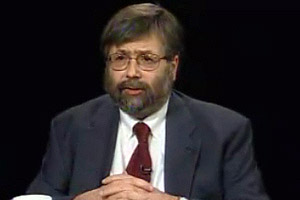
JOHN GREEN: Welcome to the Religion and Politics ’08 discussion series from the Pew Forum on Religion & Public Life. I’m John Green, senior fellow on religion and American politics at the Forum. Today we’ll be discussing religion and progressive politics in the 2008 election.
A variety of religious voices have been prominent in the 2008 presidential campaign, and to the surprise of many observers, these voices include religious activists with liberal and progressive perspectives. Who are these activists? Where do they come from, and what impact might they have on the 2008 election?
To help answer these questions, we have three distinguished guests. Laura Olson is a professor of political science at Clemson University and has done extensive research on religion and American politics. She is the author of a forthcoming book with the working title of Generals Without an Army: The Protestant Left in American Politics.
Jennifer Butler is the Executive Director of Faith in Public Life. She is an ordained Presbyterian minister and recently represented her church at the United Nations. She is the author of the book, Born Again: The Christian Right Globalized.
Chris Korzen is the Executive Director of Catholics United. He was in charge of the Catholic Voting Project in 2004 and 2005, and is co-author of the forthcoming book, A Nation for All: How the Catholic Vision of the Common Good Can Save America from the Politics of Division.
Welcome to you all, and thank you for joining us today. I’d like to begin with an issue of nomenclature. The phenomenon that we’re talking about has different terms that have been used. Some people talk about the “religious left,” some people have talked about “spiritual progressives,” and there are other terms as well. Chris, what do you think the best terminology is to describe this group of activists?
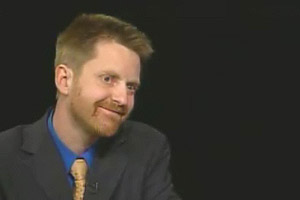
CHRIS KORZEN: Well, it’s an interesting question. You know, we tend to have a number of labels that are put on us as an organization by the media. Sometimes it is the religious left, or we’re called a progressive organization; we’ve been called conservative and orthodox and traditional. I think it speaks to a sense of where people are in America right now: that they’re desperately tired of the kind of politics of division that we’ve seen in our country. They’re seeking a more robust debate about religion and politics – and really to tackle the fundamental issues of our time, which are things like war, poverty and the climate crisis.
To your question of nomenclature, it’s not really easy to put that kind of label on our movement; but if folks want to call it the progressive religious movement, that’s fine. Really, we’re united by a sense of a need for change in our country right now.
GREEN: Laura, what do you think about terminology?
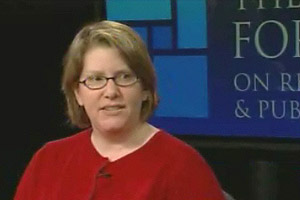
LAURA OLSON: Well, I think there are a number of different ways of thinking about what this whole movement, if you’ll call it that, is or is not. Religious left, it seems to me, is kind of a reactionary term; it poses this movement in opposition to the religious right. And that, in a sense, is a defensive way of projecting one’s image into the political world. I think that talking about a progressive Christian movement, as Chris suggested, might be a little bit more productive way of thinking about it.
I would also argue that this is, broadly speaking, a social movement. It suggests that there are lots of people out there who are interested in this movement, many of whom have been silent for a good long time, actually. There are many organizations out there that may or may not be aware of one another. And so in a sense it’s a loosely organized sort of constellation of people and organizations, and I think that would allow us to call it a movement, I think, pretty productively.
So you could call it the religious left in a very general, reactionary sense. But I think more correctly you’d call it progressive people of faith uniting, a religio-political left movement or something of that nature.
GREEN: Jennifer, what’s your perspective?
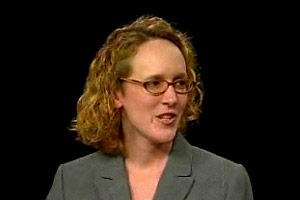
JENNIFER BUTLER: Well, one of the terms that has resonated a lot, I think, across these kinds of groups that we’re talking about is common good: that people want to work together for the most vulnerable in society. They want to work together to make sure that everybody’s needs in society are met, and that is often counter to the sort of rampant greed and individualism that we see in society today.
The other thing that we see, too, is that people resist any sort of political label being imposed on them. They want the label, or their name, to come from their particular faith community. Sometimes, for some Protestants, that’s prophetic. They want to say that they stand outside these political categories and that they want to hold both to account. They want to be nonpartisan. They want to reclaim faith. And they want to reclaim American debates so that they’re focused on real issues of the day.
GREEN: Are we talking about primarily politics here, or are we talking about theology? Or are we talking about both? Jennifer?
BUTLER:I think we’re talking about both. People want to be relative to what’s happening in the political realm; but they want to come from a place and be fed from a place that’s spiritual, that’s biblical, and that holds to the church teachings or the teachings of their faith community. They want to often bridge the divisions that we’ve seen and the polarities that we’ve seen in American culture in recent years. We’re seeing a constant broadening of coalitions to include, for example, moderate white evangelicals. And people are looking for ways to unite around issues that draw them together so that they can be more unified for justice and the common good.
OLSON: I might add that Bob Edgar, in his book a few years ago, referred to a religious middle – moving away a bit from that term “left” because that can be off-putting, as I suggested before. People are not putting political labels on and coming at it from both a spiritual and from a political perspective. And I think too that there’s this sense, which many people of faith have had for a while now, that in order to be religious you have to also be conservative – this whole God-gap thesis that’s been pervading the media. And I think there’s a sense that that doesn’t capture the whole of American religion and how it might interface with politics.
GREEN: Chris?
KORZEN: Yeah, and if I could add to that. I think in addition to this being political, it’s profoundly a cultural movement. In recent years, perhaps in the past few decades, that’s a space that I think the progressive secular movement has been unwilling to step into. And because of that, we’ve seen the rise of the religious right (because it did start off primarily as a cultural movement). This isn’t just about policy; it’s not just about how we spend our taxes and the kind of economy that we’re going to have. It’s really about how people live their lives, too. And we’re hearing from the folks that we speak with a real need to get away from this culture of greed and materialism – to start to address that as a society. It’s something that we need to challenge our leaders to do more as well. So it is a cultural movement.
GREEN: Yeah, if my memory serves me correctly, this isn’t entirely new. It seems to me that there have been counterparts to this type of politics in the past. Laura, could you help us understand a little bit of the history of liberal or progressive politics by religious people?
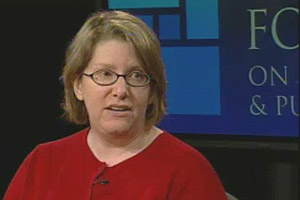
OLSON: Absolutely. Before the 1980s, I think a lot of times people assumed that if religious voices were speaking on politics, that it was almost always going to be coming from a left direction rather than a right direction, and that was true. And if we go back 100 years ago, we find a couple of very important currents that are going on historically, for the U.S. and perhaps even for the rest of the world, when we think about how religion and politics intersect.
First, in Protestantism, of course, there was this movement called the social gospel; it was this revolutionary way of thinking about how people of faith ought to be in touch with this world. Not only should people of faith be involved in this world, but they also ought, in many very important ways, to go out into this world and help the poor, the disadvantaged and the forgotten. They should do this by modeling Christ as an example of someone who himself didn’t forget about the poor and the disadvantaged and the forgotten. One of the leaders, theologically, of that was a fellow by the name of Walter Rauschenbusch, who ended up having a lot of influence on a lot of mainline Protestants, in particular.
Meanwhile, right around the same time, the whole kind of impetus within Catholic social teaching is coming from the Vatican, from Pope Leo in Rerum Novarum. He ends up saying it’s very important for us as Catholics to be concerned about life – to be concerned about affirming life in all of its various forms.
And so these two kinds of currents come together right around 100 years ago to really give a lot of energy to the idea that religion in the United States should, perhaps, be connected to politics in ways that are designed to help the poor and the disadvantaged.
And what we end up seeing historically is that Protestants and Catholics, and Jews as well, end up coming together in the middle to the late part of the 20th century in all sorts of social movements. These were designed, again, to help the poor and the disadvantaged and the forgotten – from the civil rights movement to the nuclear freeze movement, from the worker justice movement to the sanctuary movement that sheltered people who had fled Latin America in the 1980s. There were all kinds of movements that were very interfaith and perhaps ecumenical in nature. But they were all informed by this idea that people of faith are compelled to go out into the world in order to be acting in consistency with their faith; they should be helping the poor, the disadvantaged and the forgotten.
GREEN: That brings us right up to the present. And Jennifer, could you tell us a little bit about some of the recent developments here in the 21st century and particularly about Faith in Public Life?
BUTLER:Sure. There are a lot of new developments. For one thing, a couple of new organizations were founded in the wake of 2004; it was a real wakeup call for this particular group of religious people. There’s this idea that the values voter had swung the election in the direction of George W. Bush, and people on the progressive side of things felt like this does not describe American values. It doesn’t describe our values, and we can’t let this happen again. So there’s been some new infrastructure put in place for this movement to be better organized and to make itself heard better in the media.
One of those efforts was the founding of Faith in Public Life. Forty religious leaders came together in December 2004 to discuss this issue. They decided to create a resource center for justice and the common good with the mission of providing better communications and organizing strategies – helping to provide more coordination for the movement that is bubbling up out there.
But it’s not just inside the Beltway. There is another organization called Catholics in Alliance for the Common Good, which I think Chris can speak to. But outside the Beltway as well, there were a number of organizations and coalitions that just bubbled up from the grassroots. One of them, one of my favorites, is We Believe Ohio: a coalition of a couple hundred clergy across Ohio who were tired of the religious right dividing the state and focusing on issues of intolerance. Moderates and progressives wanted to unify the state around the most important issues in that state of poverty and healthcare and education. And they have been a very strong presence over the past year and a half and will continue to be in the coming months.

GREEN: Chris, tell us a little bit about Catholics United for the Common Good and your take on recent events.
KORZEN: Sure, our organization is actually Catholics United, and we got our start back in 2004 with an experience very similar to what other folks in the religious community dealt with. There was at that point a very organized attempt by the Republican Party and by conservative Catholic organizations to reduce to just a handful the scope of issues that Catholics should consider when they go to vote. And they were these issues that played very well to a conservative and Republican agenda: abortion, same-sex marriage and issues like that.
We understood that our church called us to a much deeper level of political engagement. In fact, the U.S. Catholic Bishops had put out in 2003, as they do ahead of every election, a document detailing some 50 issues that folks should consider. And that included poverty and war and the death penalty. The point of it wasn’t that we can reduce our faith to just a handful of issues or any issues at all, but we have to consider the connections among them. And more importantly, what can we do as a society? How can we have a productive political conversation about how to build the common good?
Our organization, the Catholic Voting Project, which evolved into Catholics United, did some work in being able to put that message out there. But we found that because we didn’t have that same infrastructure, it was difficult to get that across. So since then, we helped found Catholics in Alliance for the Common Good, which has done a great job helping increase the voice of the entire movement. And this doesn’t just include secular organizations like ours; it’s orders of women religious and priests – folks who are really owning, I think, the center of Catholic theology. It’s an orthodox take on what it means to be Catholic and promote Catholic social teaching. So we’ve seen those organizations find a much greater voice in promoting accurate Catholic theology in the past four years.
GREEN: Laura, where do Jennifer’s and Chris’ organizations fit into the broad spectrum of progressive groups? I know that you’ve studied these groups, could you walk us through the basic categories on the religio-progressive left?
OLSON: Absolutely. I think the first distinction we need to draw is that there are groups that are explicitly tied to specific religious traditions. That would include, for example, the Presbyterian Church USA Washington Office. It would include Chris’ organization because you’re explicitly focusing on Catholics. Not that you, of course, wouldn’t work with people who aren’t Catholics, but it comes from a Catholic place. So it is informed in a sense by a particular type of theology. So there are many groups that would be of that nature such as the ones that I already mentioned.
And then we have separate from that a whole range of groups who are either interfaith or ecumenical; and these terms, of course, mean different things. And Jennifer’s group would, I think, be one of these – intentionally working across faith traditions. And some of these groups are big; some of them are well-known; many of them are less well-known. Some of them work on big agendas. Others work on very narrow agendas. Some are national in nature; some are regional in nature.
An example of a big ecumenical, interfaith-type group that everyone probably has heard of would be the National Council of Churches, which has been around for a long time now. That’s a group that really has pretty profound roots in American politics. Another group that has been around for, I think, about 10-12 years is the Interfaith Alliance. It focuses its agenda a little bit more on sort of church-state issues and justice issues – perhaps not the full range of issues that a group like the National Council of Churches would focus on – but nevertheless isn’t focused just on one issue by itself.
Then there are groups, again some that are large and some that are small, that have narrower agendas. For example, Bread for the World focuses specifically on hunger. That is its agenda; that is where it begins and ends. But of course, it would be part of the coalition that we’re talking about here.
Another example would be a group called Let Justice Roll that is focused explicitly on raising the minimum wage. And that is all that they do. Of course, doing that is connected to this broader issue of trying to help people who are poor, disadvantaged, or forgotten. But in the case of Let Justice Roll, the explicit focus is on raising the minimum wage.
Another piece to this is that there are now a bunch of groups, who are largely virtual. And that would include We Believe Ohio. Of course, We Believe Ohio has actual meetings, too. But a lot of what’s going on I think right now in the religio-political left, if you want to call it that, is happening virtually – which I think is very, very interesting. It’s a way of harnessing new technology to bring people together who maybe didn’t know that each other existed, both at the individual level and at the organizational level. And part of what Jennifer’s organization does is to make groups that are out there aware of one another – aware of the fact that there are other people out there who share these kinds of concerns.
And then, again, there are as I suggested more regional and local-level organizations like We Believe Ohio and like Progressive Christians Uniting, which is out of southern California. There are various other examples as well.
And a final category of groups would be community organizing groups. And this, of course, would be nothing new. Community organizing has been around for quite some time. But in any discussion of a progressive, middle-to-left focus among people of faith in the political realm, we cannot forget all the work that community organizing groups do – particularly at the local level. And most of these community organizing groups are networked with one of a few major networking organizations such as the Industrial Areas Foundation of Chicago.
GREEN: Chris, how do you see the landscape that Laura has just described? Who are the allies and associates that your organization works with?
KORZEN: Sure, it would be Catholics in Alliance for the Common Good. There is a group out of the Midwest called the National Catholic Rural Life Conference. There are orders like the Sisters of Mercy, the Leadership Conference of Women Religious and groups like that. Pax Christi USA and Network (a national Catholic social justice lobby based here in Washington) have been really strong allies in this. And in fact, we launched with them over the summer a project called Catholics for an End to the War in Iraq; it is primarily an online petition-type movement that is geared toward bringing more attention to that issue.
GREEN: Jennifer, how do you see the landscape on the progressive side?
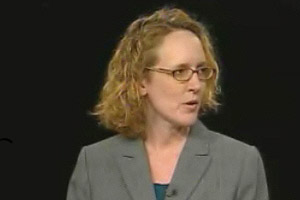
BUTLER:Well, one of the first things we did at Faith in Public Life was to map the faith movement for justice and common good across the country. And we found 3,000 organizations working on either poverty, the environment, healthcare, war and peace issues, human rights – 3,000 organizations across this country. It was a great number. And per state that averaged about 30 to 120.
And one of the purposes of that project was to quantify that this voice existed and that it was by far the dominant voice in these local communities. What we noticed is that so many of these organizations were working in either geographic or issue silos. But at the same time, we also found that they were beginning to coalesce at the local and state level to get their voice out more effectively. It’s one of the reasons Faith in Public Life was founded: to amplify that potential infrastructure and those existing organizations and to make sure that their voices are heard in public debates.
Not only is there We Believe Ohio and Progressive Christians Uniting, which Laura mentioned, but I think in the coming year we’re going to see a number of organizations like Alabama Arise, Faithful Arkansas and We Believe Colorado. We are finding every day that people are calling us saying: We want to develop this voice. And I think that’s one of the major shifts that has happened since 2004.
Some of these organizations – and I think Laura’s typology is very good – had been more content, I think, to be a quieter voice in their society. I think Robert Wuthnow wrote the book The Quiet Hand of God. And I sort of laughed when I saw that title. I think it’s a very good book, and it does describe what was happening. I think what we may see coming out in the next year or two is the louder hand of God – (laughter) – because there is a rejection of this idea that this type of religion should remain more in the private sphere. People want to have a louder voice in their communities; and it’s a voice that respects pluralism. It may come from a particular place; it may come from a particular religion. But it’s always very respectful of other faiths, and it’s also respectful of the separation of church and state. But it’s a louder civil society voice of religion on the more progressive side and moderate side.
GREEN: All of you in one way or another used the word infrastructure, which is kind of an interesting word. But Chris, what do you mean by infrastructure, and what are the sorts of things we’re talking about?
KORZEN: Well, it falls into a few categories. One of the most important advances that we’ve seen as a movement over the past four years has been media savvy and our ability to get our message to the media. Back in 2004, it was almost impossible to break through. And I remember having a number of conversations with national reporters who would tell me: Look, I mean, you don’t really have a movement to report on. They were not realizing and not seeing that there was actually something going on out there; it just didn’t have the savvy, I think, to break through with its message. So we’ve established relationships with key journalists nationwide. We have our media list together. We know how to get our message to the market in that way.
In terms of my organization, Catholics United in particular, we do a lot of work online. And we’ve built up the tools that allow us to reach thousands and thousands of Catholics at a moment’s notice and be able to move them to action. We’ve also established some infrastructure and the ability to use paid media to move our message. So for instance, Catholics United was able to run an ad campaign, radio ads, back in the fall when the state children’s health insurance (SCHIP) veto happened. And we were able to challenge members of Congress who said they were pro-life but voted against the legislation. So we were able to sort of shape that story and help folks understand that there was more to it than just a simple vote – so infrastructure like that.
Also it’s just having relationships on the ground. Jennifer’s group has done a lot of work on that and so has Catholics in Alliance for the Common Good, The latter has programs operating in the Midwest and moving out into the west coast now at this point. So that’s the kind of infrastructure that’s allowed us to help reshape the landscape when it comes to religion and public life.
GREEN: Are there other aspects of infrastructure, Jennifer, that you’d like to comment on?
BUTLER:Yeah, I think Chris has given a very good summary. Maybe I’ll add one, and that is funding infrastructure that hasn’t been there in the past. I think for a long time some of these groups were sort of neglected not only by their secular, progressive colleagues but also by their own constituents – who really didn’t wake up to this need to project their voice in a louder way. I think they were accustomed, prior to the ’80s, to being the go-to source for information on religion in public life. And then the Christian Right took over that role. So there’s been an awakening, I think, among these folks that we need to raise money to make sure that we have the kind of megaphone that we need. And that we need to try some new organizing strategies.
GREEN: Laura, what kinds of things do these organizations do? You’ve described a vast array of different groups that are organized in different ways with different issue focus, but what do they actually do on the ground?
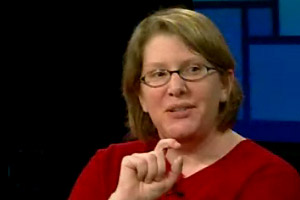
OLSON: The thing that most of these groups are interested in doing in one way or another is advocacy: whether it’s lobbying members of Congress, whether it’s lobbying state legislatures or whether it’s trying to get grassroots lobbying going among members. They do it via e-mail campaigns and via letter-writing campaigns. Clearly the goal of most of these organizations, although not necessarily all of them, is to shape public policy and to influence policymakers in some meaningful way. And of course the justification for that would be, again, to help the poor, the disadvantaged, and the forgotten – around justice issues, around peace issues, around racism and around matters such as that.
But these groups do other things as well. While advocacy would be the most common thing that groups such as this would do, there’s also quite a few groups that are interested in education: providing information to the media, to members of Congress, to other elite, as well as to churches, to congregations and to just ordinary people out there. Some groups work on creating Sunday school study materials. They work on other ways of suggesting to congregations: If you want to talk about X issue, here might be a packet of information that you could use to talk about X issue – whatever that issue might be, some justice issue probably.
And then there’s also what I suggested, and what both Chris and Jennifer have been talking about as well earlier. It is just this effort to bring folks together to get away from this idea that I think many progressive people of faith seem to have had, over the past two and half decades or so, of feeling as though I’m a lone wolf crying in the wilderness – to overcome that. The effort is to network people together to give them the sense that yes, in fact, there are other people out there who share your views and who share your approach to faith and politics.
GREEN: Chris and Jennifer, are your organizations primarily involved in advocacy, or are you involved in campaign politics? Are you involved in litigation? What’s the focus of your activities? Jennifer?
BUTLER:We’re a 501(c)(3), so we stay on the right side of that. But we’ve done a number of things. One is just providing media strategies to faith groups to make sure that their campaign is heard about. The other is that we’ve done a lot of polling recently. We noticed that the exit pollsters were not asking Democrats the same questions about their faith as they were asking the Republican voters, primary voters. And so we did some polls to find out in particular what white evangelicals were doing in terms of the primaries. And we found that there was a significant number of evangelicals that were voting in the Democratic primaries that were going uncounted. And that number seems to be increasing, and this constituency is shifting – and it’s not being paid attention to. So we do a lot of media advocacy: trying to make sure that people understand some of these new trends, and give them an ear.
GREEN: Chris?
KORZEN: Catholics United is a 501(c)(4), which means that we can do unlimited lobbying, and we take advantage of that part of our tax status – like explain the SCHIP ads that we did back in the fall. We plan more of that for this year. And we’re also going to be doing some voting guides; I think this is a big step forward for members of the progressive and moderate religious community. We’re used to seeing those from the religious right, and we intend to help educate voters specifically about the issues – how those issues relate to the campaigns in the fall.
GREEN: Is campaign activity very common across these groups, or is it mostly in the area of education and lobbying?
BUTLER:I would say that until recently, many of these groups were very cautious about getting too overtly involved in the campaign season. And some of what we’ve tried to help them do and what they’ve actually been eager to do since 2004, is to weigh in – and in a way that’s appropriate if they’re a 501 (c)(3). But they want to do that in a bi-partisan way and to also be fiercely non-partisan. Many of the folks we talk to are concerned that religion has been adulterated by politics and that their congregations and the health of their community, the religious community, is threatened by that – but also that there’s been too much compromise of separation of church and state. And so they want to navigate a third way in between that of enriching the public discourse and being more engaged in the political timetables and the media timetables (so that they’re able to be recognized and conversant in those spheres). And by doing so, they are setting a whole new tone for the conversation.
GREEN: Laura, what do you see going on? Do you see a move into campaign politics in this election year?
OLSON: You know, the first thing that comes to mind in this context is Jim Wallis‘ very visible campaign from a few years ago of God is not a Republican or a Democrat. And I think that reflects what you’re saying. The word Republican was in big letters; the word Democrat was in smaller letters. But the point remains that God is not a Republican or a Democrat. I think what Jennifer is saying is 100 percent spot on that up until very recently, and by very recently I mean probably right now, there really hasn’t been a whole lot of movement into the electoral forum. I think part of that is because moving into being involved in electioneering can be a very difficult thing. Of course it can compromise tax-exempt status; and if you haven’t got a foothold in policy-based advocacy, I don’t know that you’re going to have a whole lot of influence when it comes to electioneering either.
And I think, too, there’s probably at least some sense among moderate to progressive groups, faith groups, that we don’t want to just be the opposite of the religious right. And so maybe groups like Chris’ group and like Jennifer’s group might want to try and find a different way of doing religion in politics rather than just saying: Here’s what the religious right does; let’s do what they do only do it from the left kind of perspective.
GREEN: I noticed, Chris, that you and Jennifer are both agreeing with the point that Laura just made. But let me pose to you a question that’s often posed to me by journalists, which is: Well, advocacy is fine, but at the end of the day it’s elections that matter. And if this phenomenon (the religious left progressive activists) can’t mobilize voters, then it’s not going to have that much impact. How would you respond to that, Chris?
KORZEN: Well, I’m not sure I’d agree with the premise of that question – sorry, not your question but the one that you get from – you know. Elections do matter, but they’re not the be-all and end-all. And I think that when we came together four years ago to decide how we could have a better debate on religion in politics in this country, it really was about finding ways to change the narrative and change the way that we think about religion and politics.
One of the biggest, the most important messages that we try to get across is: It’s not about issues, but this really is about a broader story – about who we need to be as a people and where we need to go as a country. My hope is that we’re going to see that message picked up by the campaigns from both sides and that those will become defining issues in the election. And even in the lead-up to the election through the primary season, it’s something that we have been trying to reinforce. It is this message of the common good and how it needs to be the defining theme that we’re talking about when we talk about the election – and especially religious involvement in that election.
GREEN: Jennifer?
BUTLER:Yeah, two examples. If you talk to people who were recently elected in 2006, like Ohio Governor Ted Strickland, I think you would say that definitely it helped to have a group like We Believe Ohio weighing in on public debates. They were shifting the climate in the state to broaden the conversation and to make people think differently about how their moral values and religious values lead them into the public square.
Here’s another example of how these groups may influence the campaign season. In a couple of weeks (April 13th) in Harrisburg, Pennsylvania, a diverse board of faith leaders is holding an event which will hopefully bring together the candidates for president. It will be a bipartisan event called The Compassion Forum. It will be held at Messiah College, an evangelical college. The people who have come together to shape that event range from Frank Page, the head of the Southern Baptist Convention, to Jim Wallis, to the head of Catholic Charities, to the heads of many of the African-American churches in this country. They have come together to talk about the issues that unite them: AIDS, poverty, torture and human rights. They want to put these issues on the agenda of the presidential candidates this year. And I think an event like that can shift dynamics in a campaign season.
That is done differently, of course, than the religious right would do. The religious right would never pull together this diverse of an event and make sure that it is firmly bipartisan and prophetic. But it is one way, I think, in which religious voices are going to be able to weigh in and shift what is on the agenda of the presidential nominees.
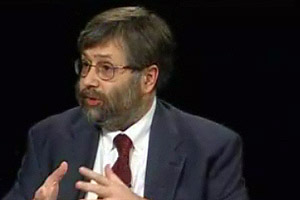
GREEN: You know, it is interesting that you mention the word bipartisan – which is of course a good word in this context. But most people, when they look at the kinds of groups that we are talking about and the kinds of issues that they are pursuing, would immediately think of the Democratic Party because historically there has been that kind of link. But it does occur to me, if this is really going to be bipartisan – is there any purchase in the Republican Party for these types of issues? Do these types of groups see that there is a constituency on that side of the aisle? Laura, what do you think?
OLSON: You know, I think that both parties always – if they are being strategic, if they are being smart – need to see potential in all Americans, in all various constituencies. I think, however, up until very recently and perhaps up until the current day, the Republican Party has been perceived correctly or incorrectly as the party that cares more about people of faith. And so the Democrats, in a sense, have a longer way to go than the Republicans do in attracting people of faith.
Whether or not, however, Republicans can take the standard pro-family agenda that has been emphasized by Republican candidates for the past 25 years or so and extend that to include other issues like climate change and poverty and things of that nature, remains to be seen. It seems to me certainly that if the Republicans could speak to some of those issues in a meaningful and a compelling way, then that would be something that would be appealing to people of faith – people who perhaps are attracted to the Republican Party around the abortion issue, but maybe aren’t happy with the Republican Party around some of these other issues.
GREEN: Chris, what do you think?
KORZEN: Yeah, I would have to agree with that in general. You know, I think that to the extent that the Democratic Party is representing progressive values in its own platform, it is encouraging to see that the two front-running candidates for the Democratic nomination right now have put considerable resources into outreach to religious communities. We haven’t seen that in the past, and I think the Democrats have suffered at the voting booth because of that. The goal for them moving forward is going to be to be able to present the vision to voters that their agenda really does line up with an authentic representation of faith in the public sphere. And again, I believe that that is most succinctly represented as the common good.
It is the same question for Republicans, too. And I think it is interesting to see – and I think Jennifer can speak to this a little bit more – how there is evidence of some disillusionment of evangelical and conservative voters with the Republican Party. It is especially so because Republicans haven’t been able to deliver on some really important, crucial concerns to those voters (abortion being one of them); but they also haven’t addressed war and the environment as essential concerns as well.
So we are seeing a realignment, if you will, about just how these values are represented on both sides of the aisle.
BUTLER:Yeah, it was interesting to see the Huckabee campaign, actually, because Huckabee is this Republican candidate who has a bit of a broader agenda as an evangelical. And then recently, he weighed in on the Jeremiah Wrightcontroversy in the Obama campaign. He said, “You know, sometimes people have chips on their shoulder. They get angry about things. If I had seen what Jeremiah Wright had seen, I might have the chip on my shoulder as well. In fact, I would have a bigger chip on my shoulder.”
Recently two Christian Right figures, Harry Jackson and Tony Perkins, came out with a book about how evangelicals need to broaden their agenda. And I find that very interesting, both of those examples, because I think it says something about the ability of people of faith also to broaden even a conservative agenda and a Republican agenda. So I think we are going to see some shifting terrain in the coming year. And it will be interesting to see how those dynamics play out.
GREEN: It is kind of interesting. And if one looks at Sen. McCain, the presumptive Republican nominee, on a number of issues (one perhaps being climate change), he seems to represent a departure from what had been the policy of the Bush administration or of other more conservative Republicans. So it is interesting. I wonder if there isn’t a little bit of a purchase on these issues even within the Republican Party.
You know, one of the questions that people often ask me – and I’m sure you all are asked this question, so I will ask it officially: How do you, or the groups that you study, or you individually work with more secular groups? After all, there are a number of groups that bring secular values into politics, some of whom are very sensitive about religious issues. Jennifer?
BUTLER:Yeah, well, it is interesting you asked that. I am speaking at the Planned Parenthood prayer breakfast tomorrow. And we have worked very closely with some think-tanks in town – with Third Way and with Center for American Progress. Many of these groups are also very interested in connecting more strongly with faith communities. And I’d say there has been a resurgence in their interest, an intensification since 2004. So I think it is extremely important to build those bridges there. And that is one of the functions that Faith in Public Life plays – connecting people. We helped Third Way, for example, recently with exploring some common ground on the polarizing, hot button, below-the-belt issues with evangelicals. And we helped find evangelicals that would be interested in coming to that table. We helped put that group together, and helped foster that conversation. So there is a lot of matchmaking going on and building of bridges among the secular organizations.
GREEN: Chris, what is your perspective on that?
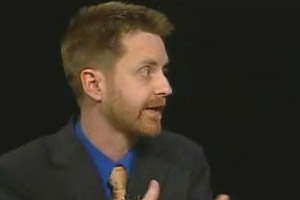
KORZEN: Yeah, we have had the same experience, and it has been heartening to see just how open many groups in the secular community have been to working with us. One example I can point to again is the Catholics for an End to the War Campaign that we launched last summer. And we worked very closely with the “Iraq Summer” Campaign; it was made up of MoveOn and USAction and these large secular progressive organizing groups. And again, they sought that relationship with us because they understood that we had a common objective in putting an end to this war in a safe and responsible way.
Also it is heartening to see that a lot of leaders of these groups come themselves from religious backgrounds. And I think that we have become so accustomed to seeing that only one side of the political spectrum – or sorry, accustomed to believing that one side of the political spectrum embraces those kind of relationships that we have come to fear building those relationships on the other side. But actually they are natural fits. And people who are doing that work from a progressive standpoint, they themselves are influenced by their past, you know, growing up as people of faith.
GREEN: Laura, but isn’t there some kind of basic tension between some of the secular groups and some of the religious groups, whether they are on the progressive side or not?
OLSON: Absolutely. And this is really from a strategic perspective. One of the great – and I don’t know if it is a danger, but it is certainly a caution – I think for the Democrats is that they have sort of a God problem. They need to address that; and certainly the Democrats have been reaching out more to people of faith in recent years.
There is even something I neglected to mention earlier, going back to the common ground theme – or common good rather. Common Good Strategies is a consulting firm now for Democratic candidates who want to try and reach out to people of faith. And I think that is all to the good because lots of Americans are people of faith. And if the Democrats want to try and do well, then they need to find ways of reaching out to that constituency.
At the same time, secular Americans tend, as we know from many, many, many surveys that we have looked at, tend to be pretty Democratic. And so the tension there is how do you bring a faith-based discourse into the Democrats’ approach to the American electorate while not alienating people who are secular – not alienating people who really don’t want much marriage between church and state at all? And so that, I think, really is the challenge that the Democratic Party and that the religious left (not my favorite term) -but, the religio-political progressive movement, whatever you would like to call it – will certainly face in the years to come.
GREEN: Let’s talk about the other side of this – talking here for a few minutes about the possible alliances between secular groups and religious groups on the progressive side. But of course as we have been discussing, many of these groups come out of religious communities. And some of those religious communities adopt issue positions that have been more favored by the right and by the Republican Party. And one only has to think about the issue of abortion, for instance. And not to put you on the spot, Chris, but how does your organization deal with the pro-life position of many Catholics?
KORZEN: Well, this is an issue that I love talking about because I think the quality of the abortion debate in this country has been severely lacking, even for the past 30 years. And Americans by and large are desperate to find some common ground solutions to this. We know that they are not generally comfortable morally with the practice of abortion. But we also know that they don’t feel completely that abortion should be made illegal. So that is our starting point and should be the beginning for our productive and fruitful conversation about how can we address this issue.
We found that the most effective way to work toward building a culture of life is to really think about our economy and how our culture broadly supports the family and supports life. We know that in the ’90s, for instance, when the economy was running strong and people had jobs and health care that the abortion rate went down. Our organization actually did a study looking at county-level data in Kansas, and we found that counties that had the highest concentrations of Head Start centers and where unemployment was lowest actually had lower abortion rates. So there is a clear connection between the quality of our economy, the supports that we grant as a society to our families, and that abortion rate. And we should be addressing it from that perspective.
And it is heartening to see that the Democratic control of Congress has actually taken this up in recent years and has two bills on the table right now that would provide that kind of support specifically with the intent of lowering the abortion rate.
GREEN: Jennifer?
BUTLER:Yeah, there has been some recent progress in that arena because it has been a point of tension. I mentioned earlier our work with Third Way. And they worked with leading evangelicals and progressives to outline a strategy for approaching the abortion issue which, interestingly enough, did not involve compromise. And they were very clear that they didn’t want a watered-down solution to the problem, nor did they want people having to compromise on their ideals. But what they did outline was the best practices proposed from both sides, from conservatives and liberals, that would reduce the need for abortion. And there’s a bill, like Chris said, on the table in Congress right now, the Ryan DeLauro Bill, which outlines many steps that these two communities can take together. Leading evangelicals like Joel Hunter, pastor of a mega-church in Florida, and David Gushee, who just wrote a book on the evangelical center, came together to help shape that agenda. And I think it outlines a way that these groups can move forward together on that issue.
GREEN: Laura, does this mean that the culture wars are dissipating in American politics?
OLSON: You know, that’s sort of a question that – were there ever culture wars? The answer to that, of course, is yes. Of course there’s been this cleavage. Of course that it, especially at the elite level, has been around. But I think when we talk about culture wars, if we try and put everything into that box, it becomes kind of difficult. A lot of Americans really don’t take sides in the culture wars – especially when we’re talking about Americans at the grassroots level.
Are the culture wars over? Well, no. You know, to the extent that people aren’t ever going to completely be able to agree on issues like abortion, on issues like gay rights; this sort of thing, no, we’re never going to resolve that. But one thing about the abortion issue, and where it fits in this whole movement that we’ve been discussing here today, is that groups that are pro-life when it comes to abortion and then also pro-life when it comes to many of these other sorts of issues – justice, poverty, all of this other kind of substance – really do themselves a favor in a sense.
You might think, well, that’s sort of talking out of both sides of your mouth. If you’re pro-life on abortion, that’s a conservative stance; and if you’re pro-life on all of these other matters, then that’s a more liberal stance. But what it does when it comes to advocacy is gives a group like Chris’, like many groups in this movement, the opportunity to speak productively with both Democrats and Republicans. And to the extent that you’re able to speak meaningfully with both Democrats and Republicans, you end up having more clout.
GREEN: One of the things that a lot of people like to do in American politics is go to court because we can do politics through courts as well as through elections and legislatures and so forth. Can any of you comment on litigation strategies that might be employed by people on the progressive, religio-progressive side of politics?
OLSON: Well, I think this is one other piece of advocacy. You’ve got your grassroots advocacy, you’ve got your standard lobbying strategies, and then you’ve got filing amicus briefs with courts. And that’s something that religious traditions across the board have done for a very long time. You try to make your views known on these various cases that are pending before the courts – particularly at the federal level, coming from all kinds of different perspectives. And to the extent that religious groups engage in this kind of advocacy, certainly religio-political, religio-progressive –
GREEN: (Chuckles.)
OLSON: See, we need a better term for this! (Laughter.) Religio-political progressive groups engage in this sort of litigation as well.
GREEN: Maybe the infrastructure should be called together to get the terminology finally sorted out – (laughter) – so we can talk about these things. (Laughter.) We’ve been talking about a lot of different issues here. Jennifer, I wonder if you could maybe give us your sense of what the priorities are? I mean, there’s clearly a lot of different groups and a lot of different issues, but what would be the two or three most important issues this year for the groups that you’re familiar with?
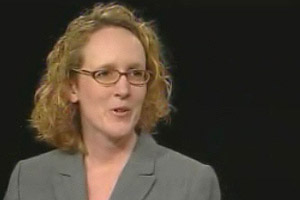
BUTLER:Yeah. I think one that doesn’t get mentioned a lot is to change the nature of political discourse in this country. It’s something that We Believe Ohio has worked on – a “sleaze-free” zone for the state of Ohio to clean up election-year politics and really get people talking about substance. I think it’s one reason that Obama has resonated with so many people across the aisle, on both sides of the aisle.
But I think they want to change the nature of the conversation, so that we’re having real debate instead of a lockdown and polarization – no conversation going on. The other issues that are really important are climate change. And it’s really interesting, just a couple of weeks ago, to see a young seminarian son of one of the leaders of one of the Southern Baptist convention come out with a statement signed onto by some of the leading figures in the Southern Baptist convention saying that they hadn’t gone far enough on climate change. That they needed to do better; they needed to do more.
So that is a unifying issue and it’s an issue that is – Interfaith Power and Light is one of the fastest-growing progressive faith organizations that I’ve seen out there.
GREEN: Could you describe that organization for me?
BUTLER:Yeah, it was started by an Episcopal priest out on the West Coast and just seems to be growing like wildfire. It’s engaging religious communities across the country and really taking off, trying to get people mobilized around this issue.
The other issues are torture and human rights issues like Darfur and genocide – so international policy and then poverty as well.
It was interesting to see just last week, Joel Hunter teaming up with some of the leaders of Alabama Arise to criticize Florida tax policy. You know, so we’re getting at some of the structural issues behind poverty, not just the charitable issues. We’re trying to get at this recent economic crisis and create some structural change that will really help people.
GREEN: Chris, from your perspective, what are the top two or three issues?
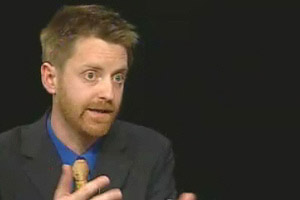
KORZEN: Well, I agree with Jennifer about the issues and, we’d have to add health care and jobs and the economy to that. I think, though, that it’s about something much deeper than that. The U.S. Catholic bishops, in their 2003 Faithful Citizenship document (the 2007 document, which is similar to the 2003 one, is available here), include this line that says, “The important question we should be asking in politics is not, ‘Are you better off than you were four years ago?’ The question is, ‘How are all of us, and especially the poor, faring?’”
And for as long as I can remember, the dominant political narrative in this country has been basically, how do we all succeed on our own and how do we free up the individual to pursue his or her own interest without concern for the broader community? And we’ve seen the erosion of government in the process and this political trajectory that’s said: You’re basically on your own.
I think the mortgage crisis and the failure of the economy in general that we’re worried about now is evidence of how that thinking hasn’t achieved what we should be trying to achieve as a society – as well as the fact that we don’t have health care. And so, we need to be shifting our political discourse and starting to ask, “What is the role of government in ensuring that people have these basic needs? How can we come together as a society and as individuals – for us not to be just citizens pursuing our own objectives, but to really work toward the broader success of everyone?” Questions like that. That is the essence of the common good.
So another thing that we need is leadership to be able to challenge people and to hold Americans and people of faith to a higher standard. It’s not as easy as just: We’ll take care of the government, and you need to go off and just take care of yourselves. We need politics as a process that challenges us to become active participants in that. I think of President John F. Kennedy’s quote: “Ask not what your country can do for you, but what you can do for your country.” And that’s really what we need and what we’re desperate for as a society right now, I believe.
One more thing is just to challenge directly this culture of greed and materialism. I keep seeing this commercial on TV about a TV. And it’s got the Queen song that says: “I want it all and I want it now.” We can’t tackle the essential concerns of society right now, of the 21st century, like health care and climate change and war and poverty if we’re not ready to challenge ourselves to that higher standard.
GREEN:When we began our conversation, we were talking a little bit about some of the changes of the last couple of years. Jennifer, if we were having this conversation 10 years from now, what do you think you would see on this side of politics?
BUTLER:I think we may see a restructuring of American religion and politics. I really enjoyed Robert Wuthnow’s book that was written in the ’80s, The Restructuring of American Religion, where you have people identifying more by conservative or liberal, that label, rather than by their denominational label. And I’ve been thinking recently that we may see a whole restructuring in which you have the kind of issues that Chris and I just mentioned that are unifying people across these culture-war issues. People may also come together on the culture-war issues, on the issues that they disagreed on before, and find common-ground solutions to those that don’t compromise either of their positions.
So I think you’ll have a broader coalition of people that would include not only the Christian left, but the “convertible Catholics”, moderate evangelicals, African-American churches, the Muslim community and the Jewish community – all working together around issues of common concern.
GREEN: And Chris, what would you imagine that we’d see 10 years from now?

KORZEN: I’d have to agree with a lot of what Jennifer said. Again, we’re desperate to be beyond this division and to be working together as people of faith, as Americans, to tackle the problems together that we need to tackle. It’s not as easy as just letting two sides battle it out and hope that we get a nice, least-common-denominator solution in the process. We all have to be active participants in that, and we can’t tackle these problems unless we work together.
GREEN: Laura, there’s been a lot of talk among our colleagues in political science about cycles in politics, and I wonder what your perspective is on this? We seem to be in a cycle with an up-tick in progressive voices in politics. Ten years from now, will that cycle have passed? What do you think?
OLSON: You know, everything old again is new again right now. (Laughter.) Things come and go in American politics just as they come and go in fashion. They come and go in just about any sector of society. And for a long time, of course, a progressive voice coming from a religious sort of basis in American politics was perhaps absent or was perhaps – I don’t know that it was absent necessarily, but it was absent from media coverage – it was absent from the public square to some extent.
And now, we’re cycling back toward having, it would seem, more of that kind of witness once again. And part of that is because, again, it’s a cycle; things come and go. And the religious right, the pro-family movement, (which is the name that the movement itself prefers), it really has – it hasn’t gone away by any means, but it’s sort of gone into a little bit different kind of mode in recent years – become quite a bit more state- and local-focused. It doesn’t rely on big, national organizations anywhere near to the extent that it once did and, as a result, perhaps there’s a perception that the religious right is dying.
I wouldn’t necessarily say that’s the case. I would say that particular brand of religion and politics has taken on a different form; it has adapted itself to state and local realities. And of course there’s, to some extent, this reaction against the Bush administration among some people of faith that another way is needed, that another voice ought to be accommodated in the public square. So to an extent, these two things have come together to create a strategic opening, in a sense, for a religious middle, religious left, to take hold.
Ten years from now? Boy, I wish I knew – (laughter). I wish I had that crystal ball, but unfortunately I don’t. But from a scholarly perspective what I’d say is, it depends. (Laughter.). But seriously, it certainly appears to me at this particular point that we are – that the religious left, if you wish to call it that, appears to be on the upswing. It doesn’t necessarily mean that the religious right has vanished. It just means that maybe these alternative voices are coming into the public square a bit more than has been the case in the past 25 years or so.
GREEN: This being an election year, we can’t let you all go without asking you what impact you think that this phenomenon will have in the 2008 election, which will occur in just a few months.
Jennifer, what do you think? What impact will progressives have in this year’s election?
BUTLER:I think this will be the year of the common good voter instead of the year of the values voter. And following that election you’ll see that broader coalition I’ve been talking about presenting some demands to whoever’s in leadership on these common ground issues that unite these communities. And they will be taking things forward in a more prophetic way than has happened in the past.
GREEN: Chris?
KORZEN: Yeah, I think we’re going to see a redefinition of this values narrative that came to the surface in 2004. Life and family aren’t going away as essential and important concerns, but the way we think about them is going to change. And we can’t have strong families in this country if people don’t have jobs and healthcare. That’s the message that’s going to define this election cycle, in terms of those kind of values.
GREEN: Laura, we just asked you to predict 10 years; can you predict six months? What do you think is going to happen in 2008?
OLSON: Well, you know, I think – I don’t want to predict which candidate is going to become the next president. You know, if I could do that then – I don’t know.
GREEN: We’d have to have you back.
(Laughter.)
OLSON: That’s right. But in any event, it seems to me that the Democrats, as I suggested before, are very much aware that they need to do a better job of trying to reach out to people of faith. And both of the frontrunner candidates right now, on the Democratic side, have people on their campaign staffs who are working very, very hard to accomplish just that.
And it seems like the time is very much right for the Democrats to undo some of this God gap, to close some of that ground. And I certainly do think that people of faith are going to be mobilized by a variety of different issues. Perhaps there will be a wider variety of issues than what we’ve seen in the past several elections, in particular the two last presidential elections, just through a reframing of what values means and of what life and family might imply in the public square. But who is going to win in November? I’m going to hold out on that one.
GREEN: (Chuckles.) On that note, we’ll need to bring this conversation to a close. And I’d like to thank our three guests, Laura Olson, Jennifer Butler, and Chris Korzen. I’m John Green of the Pew Forum on Religion & Public Life. Thanks for joining us.
The written transcript of this event has been edited for clarity, spelling and grammar by Cheryl Jackson. The event was taped on March 27, 2008.




